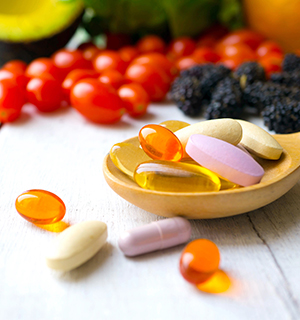Taking care of your heart is one of the most important things you can do for your body. One way to do this is by incorporating supplements into your daily routine.
Supplements can help your bones, muscles, and many other parts of your body. Specifically, your heart! Studies show that some of them can help lower cholesterol, improve blood pressure, and other things that put you at risk for heart disease.
In honor of American Heart Month, we thought we would show you the best supplements for your heart. Here are five nutrients that can be a good addition to your heart-healthy lifestyle!
1. Fiber
Fiber can help reduce cholesterol when combined with a diet low in cholesterol and saturated fat; and seems to be most effective when used with diet and exercise for contributing to weight loss.
The best way to get fiber is from food. However, if you don’t include enough fiber-rich food in your diet, choose a fiber supplement that has different types of fiber in it, (both soluble and insoluble). When taking a fiber supplement, be sure to stay well hydrated.
2. Fish Oil
Full of omega-3 fatty acids, fish oil can lower levels of triglycerides- an unhealthy fat in your blood. It may also improve blood pressure. The American Heart Association recommends that all adults eat at least two 3.5-ounce servings of fish a week, or incorporate a fish oil supplement. Check out NRG Active’s pure fish oil supplement for a great way to get started!
3. Garlic
Garlic may scare off heart disease–not just vampires. There is much evidence suggesting that garlic can support both cholesterol and blood pressure, as well as slow the buildup of plaque in your arteries, which in turn, lowers your risk of blood clots.
Research shows that both garlic in food and in supplements may help. If you are someone who doesn’t love garlic’s strong flavor, you can easily increase your intake with odorless garlic pills.
4. Green Tea
Green tea has been enjoyed for centuries, and used as an effective aid in treating high cholesterol. Green tea drinks are preferred over green tea extracts, however they both are effective.
5. Coenzyme Q10
Coenzyme Q10, or CoQ10, is an enzyme that the body naturally produces to facilitate important functions including blood pressure regulation. CoQ10 also functions as an antioxidant that prevents free radicals from harming the body.
Natural production of CoQ10 slows as we age, so it’s important to add foods high in CoQ10 or supplements to your diet. Fish, meat, and whole grains are high in CoQ10. Skip supplements containing ubiquinone, which is more common, but widely seen as less effective.
Disclaimer: Don’t take a supplement just because it’s labeled “heart healthy.” Not all of them are guaranteed to help you, and it can be dangerous to get too much of some of them.
